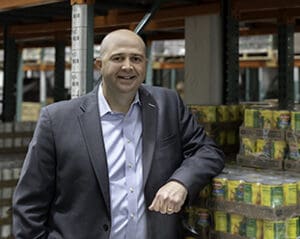 Jason Jakubowski, President and CEO at Foodshare, spoke with MetroHartford Alliance Content Manager Nan Price about the role Foodshare plays in helping the community come together to help solve hunger issues.
Jason Jakubowski, President and CEO at Foodshare, spoke with MetroHartford Alliance Content Manager Nan Price about the role Foodshare plays in helping the community come together to help solve hunger issues.
NAN PRICE: How is Foodshare involved in the Hartford region?
JASON JAKUBOWSKI: We are embedded in the fabric of Hartford, whether you see our trucks or you’re volunteering with us. Foodshare services all of Hartford and Tolland counties. There are about 118,000 people who are food insecure in these counties. We visit more than 60 different mobile Foodshare sites in a two-week cycle and we have nearly 300 partner programs we provide food to around the area. Many are within Hartford itself, but there are many in the suburbs, too.
As a nonprofit, we’re fortunate to benefit from the generosity of the area. We couldn’t do what we do if it weren’t for contributions from people who have means within the area, whether they’re able to volunteer or donate.
That’s one of the things I love about the Hartford area, we acknowledge that there is disparity in terms of wealth and, instead of ignoring it, those who do have means feel an obligation to help those who don’t. And Foodshare is happy to be a catalyst for that.
NAN: As a 40-year-old organization, in what ways has Foodshare evolved over the years?
JASON: We proudly say we’re changing what it means to be a food bank. Forty years ago, food banking was just about collecting and distributing cans of food. Nowadays, we see ourselves as more of an antipoverty agency. It’s not just about distributing food out into the community, it’s figuring out why there are pockets of poverty in the community and what can we do along with other organizations to help people out of that cycle of poverty.
For example, we do SNAP outreach with a team of volunteers who help families fill out their SNAP forms so they can get nutritional assistance from the federal government. We also have Hunger Action Teams, which is something unique to Foodshare. These are groups of community organizers from different municipalities who bring folks together on a monthly basis to help develop solutions to hunger.
We have an Institute for Hunger Research and Solutions that looks at the problem from a more national level to find ways of providing more nutritious food to the people we serve. So, we’ve definitely evolved over time.
NAN: Tell us more about that evolution. Is it challenging for a longstanding organization to innovate?
JASON: It’s essential. Even in the time I’ve been here as the CEO, we’ve had to change the way we do things. We’ve had to innovate. For instance, trying to put more produce, dairy, and meat on our mobile trucks has been a top priority because we know impoverished areas don’t have enough healthy food, which is significantly more expensive other options. We’ve also had to figure out how to message that to donors and agencies we work with.
We’ve also tried working with several other nonprofits to combine services. So, while our clients are in line at one of our mobile sites, maybe another organization can provide them with information about mental health and addiction services, literacy, personal financial options, or health care. We’ve been in talks with some local hospitals about potentially doing things like biometric screening at our sites, too.
NAN: Foodshare collaborates with hundreds of local organizations.
JASON: Yes. We’re grateful to have 300 local partners including local hospitals, colleges and universities, corporations, and smaller businesses. The old way of doing things was everybody stayed in their lane and worked in a silo. We’ve realized that just can’t happen. We’ve got to find ways of working together.
That’s one of the benefits of an organization like the MetroHartford Alliance, which we’re proud to be a part of. Like us, they’re interested in putting the right people together to form these types of collaborations.
Most of our funders are also members of the MetroHartford Alliance. We rely on that business community to provide us with the bulk of the food we get. We also rely on the Hartford business community for donations and volunteers.
Foodshare has 55 employees and we have 6,500 volunteers a year. Many come from the business sector here in the Hartford region. Many companies’ CEOs are emphatic about seeing some of their employees spending some company time doing good things for the community.
Hartford-area businesses are absolutely the engine of what we do here at Foodshare from both an economic and a labor standpoint. Whether an organization is small or large, they all do their piece to help us out when we need it.
I think in a lot of other states there’s higher reliance on government and not as much reliance on the business community as what we have here. Foodshare is thankful to have a very generous business community. And then, of course, extremely generous individual donors. The great thing about the Hartford region is we band together to improve the quality of life here.
Learn more about Foodshare sponsors
Sponsors and Board Members of Foodshare include MetroHartford Alliance investors Cigna, HalloranSage, Nassau, Capital Community College, Travelers, Kaoud, American Eagle Financial, and Stanley Black & Decker, and others.
Learn more about volunteer opportunities
